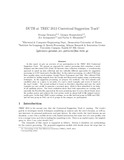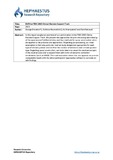Search
Now showing items 1-10 of 46
DUTH at TREC 2013 Contextual Suggestion Track
(2013)
In this report we give an overview of our participation in the TREC 2013 Contextual
Suggestion Track. We present an approach for context processing that comprises a newly
designed and fine-tuned POI (Point Of Interest) ...
DUTH at TREC 2015 Clinical Decision Support Track
(2015)
In this report we give an overview of our participation in the TREC 2015 Clinical Decision
Support Track. We present two approaches for pre-processing and indexing of the open-access
PubMed articles, and four methods for ...
Privacy-Enhanced Television Audience Measurements
(2017-02)
Internet-enabled television systems (SmartTVs) are a development that introduces these devices into the interconnected environment of the Internet of Things. We propose a privacy-preserving application for computing ...
Privacy-preserving computation of participatory noise maps in the cloud
(Elsevier Ltd., 2014-06)
This paper presents a privacy-preserving system for participatory sensing, which relies on cryptographic techniques and distributed computations in the cloud. Each individual user is represented by a personal software ...
Enhancing Deniability against Query-Logs
(Springer, 2011)
We propose a method for search privacy on the Internet, focusing onenhancing plausible deniability against search engine query-logs. The method ap-proximates the target search results, without submitting the intended query ...
Integrating Medical Scientific Knowledge with the Semantically Quantified Self
(International Semantic Web Conference, 2016-09-23)
The assessment of risk in medicine is a crucial task, and depends on scientific knowledge derived by systematic clinical studies on factors affecting health, as well as on particular knowledge about the current status of ...
Privacy-Enhanced Management of Ubiquitous Health Monitoring Data
(PETRA, 2011-05-25)
In this paper, we propose a new architecture for managing data in a Ubiquitous Health Monitoring System (UHMS). The purpose of this architecture is to enhance the privacy of patients and furthermore to decongest the Health ...
User-Centric Privacy-Preserving Statistical Analysis of Ubiquitous Health Monitoring Data
(ComSIS Consortium, 2014)
In this paper, we propose a user-centric software architecture for managing Ubiquitous Health Monitoring Data (UHMD) generated from wearable sensors in a Ubiquitous Health Monitoring System (UHMS), and examine how these ...
How much does a zero-permission Android app know about us?
(2019-11)
Android devices contain a vast amount of personal data of their owners. These data are stored on the device and are protected by the Android permission scheme. Android apps can obtain access to specific data items by ...
Privacy Leakages about Political Beliefs through Analysis of Twitter Followers
(Pan-Hellenic Conference on Informatics, 2018-11)
In this paper, we focus on privacy leakages about Twitter usersand show that simply establishing follower and friend connectionsin the Twitter network might be enough to reveal sensitive in-formation about the political ...










